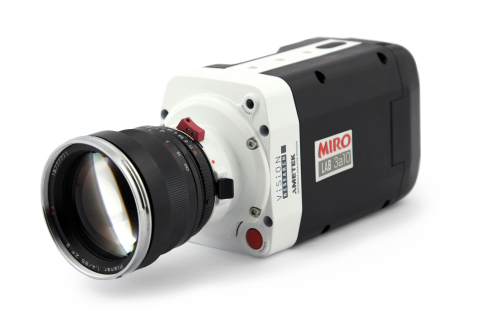WAYNE, N.J.--(BUSINESS WIRE)--Vision Research, the leader in digital high-speed imaging, has introduced a new camera series for its popular Phantom® Miro® line: the Miro LAB-Series. The LAB-Series is specifically engineered for laboratory and office settings where the camera is connected to a computer for storage, control, and image analysis. The new series offers the same award-winning, high-speed image capturing abilities as Vision Research’s other Phantom Miro series but designed for use in a controlled environment with a constant, reliable power source.
“We’ve taken great pride in the depth and versatility that we’ve presented our customers throughout the entire Miro family of cameras,” comments Rick Robinson, Director of Marketing for Vision Research. “Through the Miro family, Vision Research has offered specific high-speed imaging solutions for highly specialized applications, and the LAB-Series is no exception. The new LAB-Series was built to meet the specific needs of researchers and engineers that conduct high-speed imaging within an office-like setting. With the LAB-Series, we’ve combined simplicity and ease-of-use with the unmatched, high-performance capabilities expected of a Phantom camera.”
The LAB-Series comes in seven different performance levels giving users the ability to choose a camera model that best meets their needs for image resolution and acquisition speed. Models in the series range from the 1Mpx Miro LAB110 to the 4Mpx Miro LAB340. Maximum resolution ranges from 1280x800 to 2560x1600 with maximum frames per second ranging from 410 to 1850.
The LAB-Series has a standard RJ-45 Ethernet connector and standard BNC connections for signaling. Direct connection to a computer in a lab environment enables users to easily save, view and analyze their high-speed cines. The Miro LAB-Series cameras also have the option of using the popular CineFlash non-volatile data storage system. With optional CineFlash modules, users can conveniently save multiple cine files on-camera in non-volatile memory for later retrieval.
To find out the latest on Vision Research and its high-speed cameras, follow on Twitter at @PhantomHiSpeed, LinkedIn at Vision Research, Facebook at “visionresearch” or keep up to date with the innovations on the Vision Research blog at www.visionresearch.com/blog.
About Vision Research
Vision Research is a leading manufacturer of high-speed digital imaging systems that are indispensable across a wide variety of applications, including defense, automotive, engineering, science, medical research, industrial manufacturing, packaging, sports broadcast, TV production and digital cinematography.
The Wayne, N.J.-based company designs and manufactures the most comprehensive range of digital high-speed cameras available today, all of which deliver unsurpassed light-sensitivity, image resolution, acquisition speed and image quality.
Over the course of its 60+ year history, Vision Research has earned numerous awards in recognition of its innovations in high-speed digital camera technology and sensor design, including a technical Emmy and an Academy Award®.
Vision Research digital high-speed cameras add a new dimension to the sense of sight, allowing the user to see details of an event when it’s too fast to see, and too important not to™. For additional information regarding Vision Research, please visit www.visionresearch.com.
Vision Research is a business unit of the Materials Analysis Division of AMETEK Inc., a leading global manufacturer of electronic instruments and electromechanical devices.




